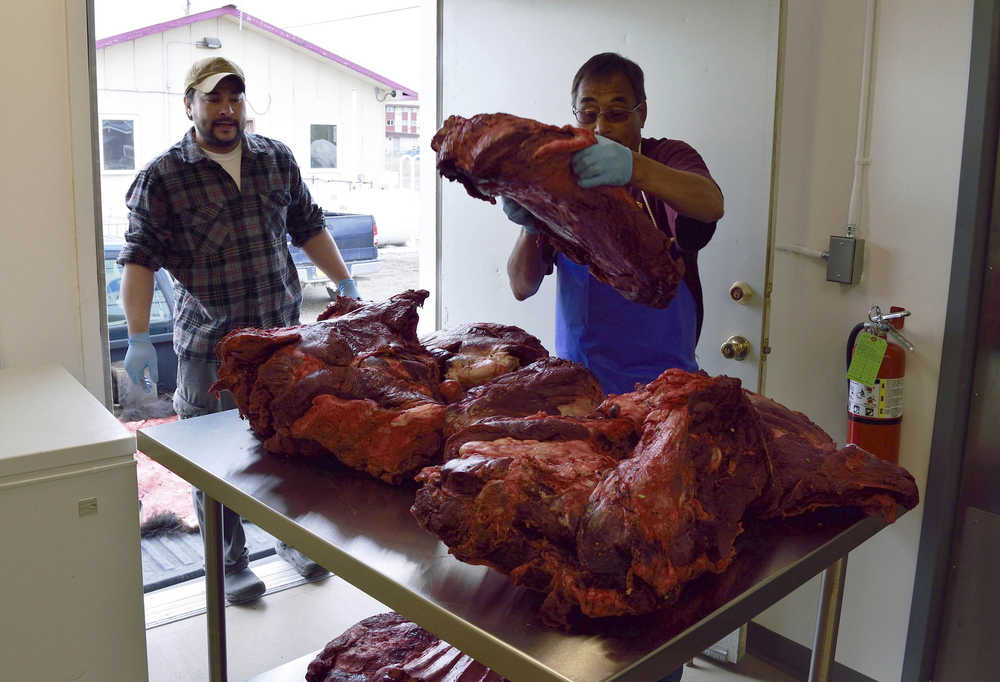ANCHORAGE — First it was musk ox stew. Then the Alaska nursing home served up musk ox meatloaf to its elderly Inupiat residents and their visiting family members.
The reaction at the long-term residential senior care facility was immediate. “’It was the bomb!’” is how home administrator Val Kreil recalled one young relative describing it. “You don’t hear that every day about meatloaf.”
The facility in Kotzebue, a commercial hub of 3,100 people in northwest Alaska, is incorporating traditional foods donated by hunters into the regular menu — a practice that’s gaining interest nationally under a new federal law.
The measure, passed last year, was largely modeled after an Alaska law and allows donations by approved sources to nursing homes, child nutrition programs and other public and nonprofit facilities, including those run by Indian tribes and tribal groups.
Traditional foods that can be obtained commercially, such as corn and bison, already have been served in some facilities, but the new law will allow access to a wider selection of foods, including game like venison, moose and caribou.
“It opens doors for our tribes and their citizens to continue having access to traditional foods,” said Leslie Wheelock director of the U.S. Department of Agriculture’s office of tribal relations. “It eases the way, I think, tremendously.”
The Birds Springs chapter of the Navajo Nation in Arizona is developing a 20-bed nursing home it hopes to open next year, and the tribe hopes the menu will include elk, deer and other staples like squash and beans from Navajo farmers.
“We owe it to our elders to get them what their lifestyles are accustomed to, and what they respond to physically, mentally, spiritually,” said Thomas Walker, a planner with the chapter.
Under Alaska’s law, other organizations have served traditional foods in their facilities over the years, according to Lorinda Lhotka with the Alaska Department of Environmental Conservation.
Boosting the new endeavor in Kotzebue, however, is a new plant down the road that is processing and storing the meat of animals donated by local hunters, forging a partnership with the 18-bed nursing home that is unique for the time being.
Both facilities are run by the Maniilaq Association, a regional tribal health care nonprofit based in Kotzebue.
The first meat processed was from a state-donated musk ox carcass. The residents got their first taste of it in early September. Until then, they had to wait for monthly family potlucks for a taste of the subsistence food they grew up with.
Most recently, the plant processed caribou meat for the nursing home, called Utugganaat Inaat — Inupiat for “a place for elders.” Some of the meat went into caribou stew with potatoes.
“It was wonderful,” said resident Mary Reed, 80. “I haven’t had it in a while.”
Before opening the plant in July, Maniilaq officials had to work through a maze of regulations with various agencies.
Initially, Maniilaq officials figured they had to get USDA approval. As it turned out, USDA provisions did not directly address such game as moose and caribou, just buffalo, bison and elk, Kreil said.
Ultimately, the USDA deferred the food safety oversight to the state DEC. All the laws were already in place. It was just a matter of juggling them to fit in a workable way, according to Maniilaq sanitarian Chris Dankmeyer.
It’s too early to tally any cost savings involved in accepting donated meets, according to Maniilaq officials.
But it costs up to $100 to purchase a 40-pound case of ground beef, plus $.78 a pound to fly it from Anchorage, so using ground musk ox or other donated meat instead is expected to add up, officials said.
The real payoff for some is the joy elders receive from their favorite traditional foods.
While many Western foods are picked at or left on plates, subsistence meals tend to be gobbled up, according to Cyrus Harris, whose job with Maniilaq includes hunting for the needs of elders.
“It makes a huge difference,” he said.

